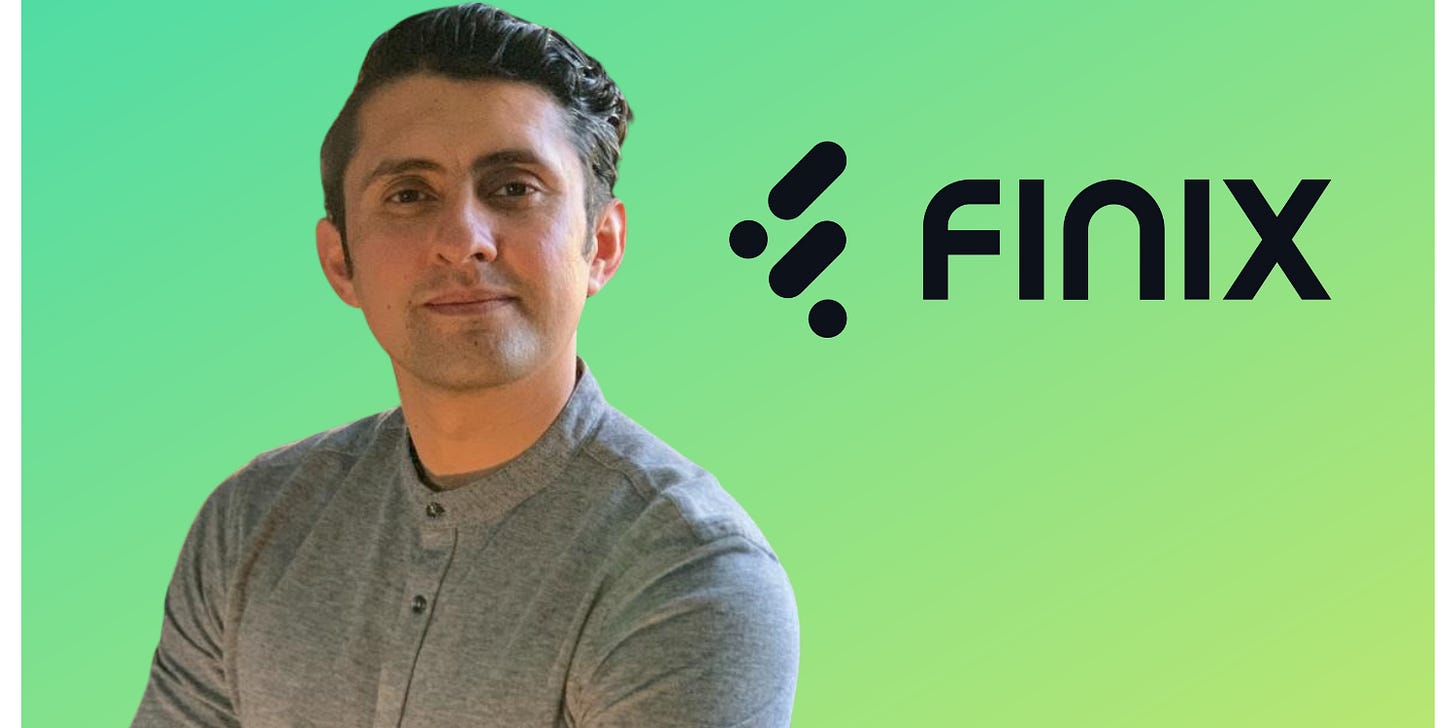This article is part of Fintech Leaders by Miguel Armaza, a newsletter with almost 70,000 builders, entrepreneurs, investors, regulators, and students of financial services. I invite you to share and sign up! Also, if you enjoy this conversation, please consider leaving a review on Apple Podcasts or Spotify so more people can learn about us.
Richie Serna is the CEO & Co-Founder of Finix, a US full-stack payment processor and infrastructure provider that processes billions of dollars a year for software platforms, marketplaces, retail, and e-commerce businesses.
Founded in 2015, Finix has raised $135+ million to date and is backed by ActOne Ventures, Homebrew, Bain Capital Ventures, Insight, Visa, AmEx, and many more.
In this episode, we discuss:
Navigating the complex world of payments
“Most financial services technology and software was built back in the 80s, right? And the broad commercialization of the internet was the mid 90s. And so 91% of payments in the US still goes through payment systems that were built back in the 80s and the 90s.”
Most U.S. payment systems were built in the 1980s and 90s, designed for simple, brick-and-mortar transactions—a many-to-one relationship between buyers and a single seller. These systems could not have anticipated the rise of digital marketplaces like Uber, Lyft, and Airbnb, which operate on a many-to-many model. This mismatch has forced modern companies to either retrofit old systems or build their own payment infrastructures from scratch, as Uber did with its 400-engineer Uber Money Team.
While ther are many modern and growing payments systems, 91% of the industry is still outdated, and Finix emerged from the realization that existing platforms like Stripe were over-abstracted and oversimplified for developers, lacking the operational depth required at scale. By focusing on the acquiring side of payments and understanding the challenges of marketplaces—such as handling pay-ins and payouts, compliance obligations, and intricate money movement—Finix offers a finely tuned payment infrastructure that addresses these complexities head-on.
Some of their secret sauce to product development
“There's no silver bullet to product development. It's a craft that you have to, like, learn and practice and try and you'll, you know, there'll be a lot of trial and error, and a lot of that is very specific to the industry and the type of product we in the payment space.”
Aligning Teams Like Vectors for Maximum Impact. Richie focuses on the importance of team alignment, drawing from an analogy about Elon Musk's approach. He likens each team member to a vector—an arrow with both direction and magnitude. "It's your job as the CEO and as the executive team to try and get all those vectors in the same direction". This alignment amplifies the company's momentum, while misaligned vectors create drag and inefficiency. With Finix team members hailing from diverse backgrounds like Uber, Stripe, PayPal, and Google, aligning operational styles requires thoughtfulness, planning, and relentless communication.
Balancing Long-Term Vision with a Sense of Urgency. As a founder, you must have the need to simultaneously play the long game while fostering an urgent pace. "Part of that is playing the long game, and then part of that is being wildly impatient". As a founder, Richie sees himself as the pace setter, responsible for channeling the team's energy in the right direction. This involves being ruthless about spending and burn rates, especially in an industry like payments where building a functional MVP can take years, regardless of how much funding you’ve secured.
The fundamental reasons why building a large payments company takes a long time
“Payments is when it comes to product development, it's kind of like physics. It is just time plus resources. You can't, even though you have a lot of cash, can't hack it. You can't hack it.”
Building a payments company isn't something that can be rushed, no matter how much capital is at hand. Richie points out that "payments, when it comes to product development, is kind of like physics—it's just time plus resources. You can't hack it." Gaining domain expertise takes years, and establishing relationships with key industry players like Visa, Mastercard, Amex, and Discover can take months to years. Inking a contract with a bank alone can easily consume nine months. Most companies could go bankrupt before that. This reality is why fintech entrepreneurs and VCs require more patience and persistence than most.
Fundraising lessons, a big anecdote… and a lot more!
Treat Fundraising as a Rigorous, Well-Organized Process. Fundraising should be approached with the same level of rigor as running a product or sales team. "They call it a fundraising process, and you should treat it like a process". This involves being extremely organized and investing significant time in planning to maximize success. The longer the process drags on, the lower the chances of a successful outcome. Therefore, having a structured approach is crucial to keeping the timeline efficient and effective. Hence why preparation is paramount and Serna advises spending at least two months before initiating fundraising to get everything in order.
When it comes to pitching, Richie recommends a strategic, tiered approach to potential investors:
Tier 1: Investors you'd be thrilled to work with.
Tier 2: Great investors you'd love to have on your cap table.
Tier 3: Investors whose capital is welcome but not ideal.
Tier 4: Investors to avoid due to conflicts or negative reputations.
Starting with Tier 2 investors allows founders to refine their pitch and address unforeseen questions. "By the time it's two weeks in, you start hitting up all your Tier 1’s," he explains. This ensures that when you approach your top-choice investors, your pitch is polished, and you're prepared for anything. Demonstrating momentum by having upcoming partner meetings or existing term sheets can prioritize your pitch in an investor's queue and increase the likelihood of closing the round successfully.
Books Recommended
Richie is an avid reader and had a lot of books to share…
Want more podcast episodes? Join me and follow Fintech Leaders today on Apple, Spotify, or your favorite podcast app for weekly conversations with today’s global leaders that will dominate the 21st century in fintech, business, and beyond.



























Share this post